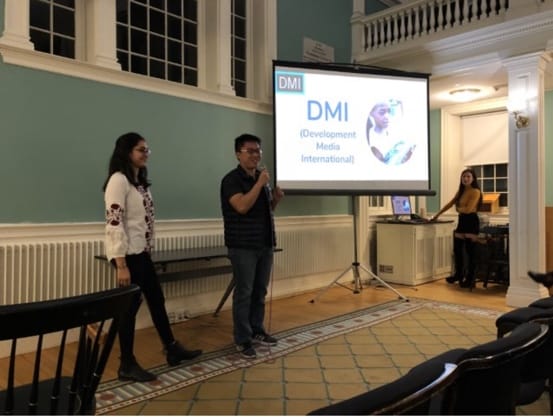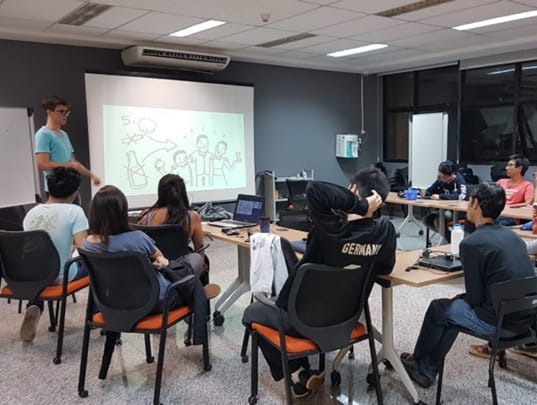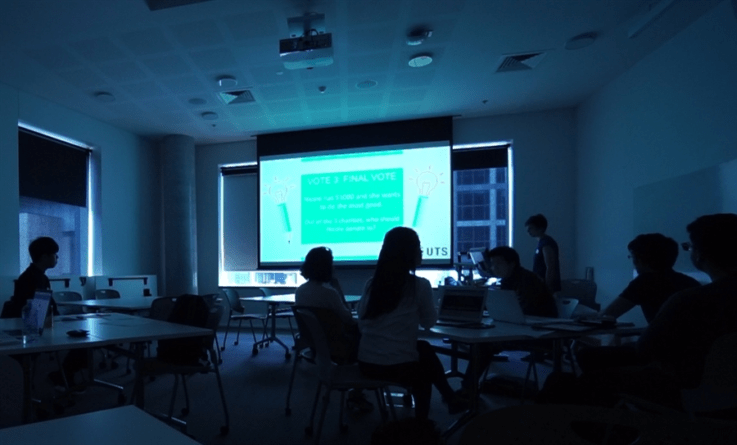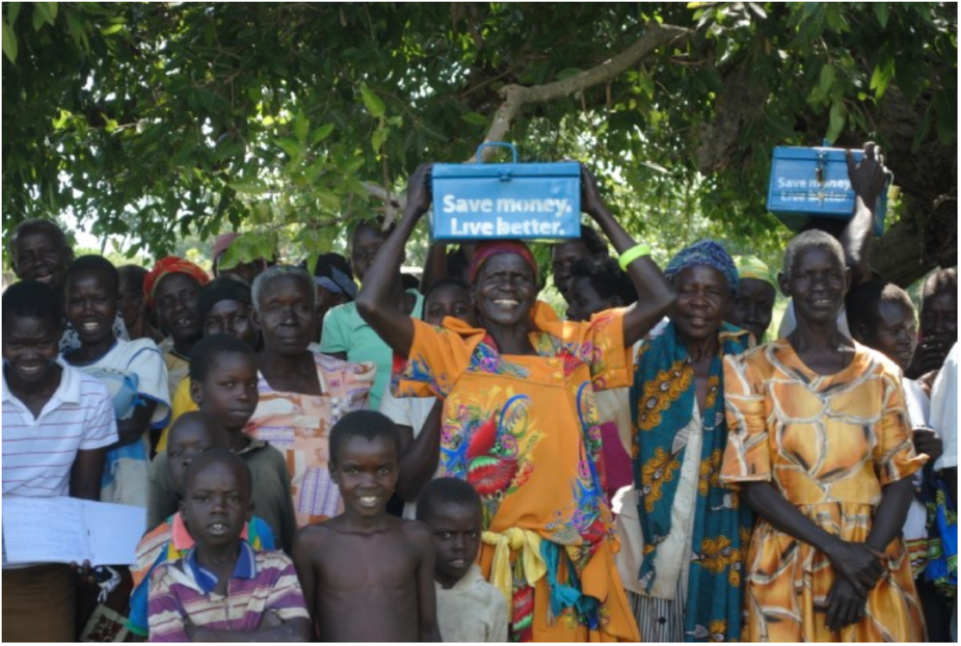What we do
We educate people about the importance of high impact philanthropy, and introduce them to resources that can guide their effective giving journeys. We empower and support our network of facilitators around the world to grow the effective giving community by providing resources, training, and funding to run Giving Games. We leverage the impact of donors’ gifts by allowing them to support teaching others about good giving while supporting great charities at the same time.

Since the first Giving Game in 2012, we have seeded high impact philanthropy concepts with over 13,000 participants. Employing “experiential philanthropy education,” where people learn by giving away real money, we have developed a proven track record of effectively engaging and inspiring participants to work towards building solutions to complex but solvable global problems. Our facilitators deliver philanthropy education workshops, offer consultation to our growing community of Giving Game facilitators, and develop tailored materials to best convey the transformative potential of high impact philanthropy to a range of audiences.
Giving Games have been applied in a wide variety of use cases since the first Giving Game was held with a student a capella group at Princeton in 2012. Giving Games have now been run with over 13,000 participants in 25 countries, spanning all continents other than Antarctica, and with a variety of objectives ranging from serving as a teaching aid to informing the execution of businesses’ Corporate Social Responsibility (CSR) obligations in India.
During a Giving Game, a facilitator introduces two to four charities for participants to consider. Ordinarily, this takes the form of a preliminary vote where participants make an initial choice based on short fundraising pitches. The facilitator then provides further information on the impact of the non-profits, the evidence supporting their work, and the program’s potential challenges and opportunities. Participants divide into groups and discuss which charity should be awarded the funds, which are ordinarily provided by The Life You Can Save or an external sponsor. This process demonstrates the value of informed, impactful and intentional giving and the role that charity evaluators can play in guiding participants on their High Impact Philanthropy journeys.
The Giving Games Project is a natural fit with TLYCS’s mission to change the culture of giving in affluent countries and direct funds to highly impactful charities focused on solving the world’s most important problems. Through employing “experiential philanthropy,” participants learn by doing, giving away real money to charities engaging in critically important work.

Our Vision
The Giving Game Project has an ambitious goal: we want to provide philanthropy education at a scale that will fundamentally shift the way people learn about, and practice, charitable giving. Why do we think we can achieve this goal, and how are we going to do it?
Our “Vision and Strategic Plan” answers these questions in detail. It outlines the specific behavioral changes we aim to achieve, the mechanisms we will use to produce them, how our product connects with our target audience, and opportunities for large-scale growth. It also lays out a path toward long-term financial sustainability, even at mass scale. Read the full plan here.
Resources for facilitators
A core component of the success of the Giving Games Project is the work of our incredible global network of skilled facilitators. Here you can access the resources we have created or collaborated on, including Giving Game powerpoint decks, a survey administration platform, and the Instructor Manual.
Giving Games Instruction Manual: Your Go-To Guide
Instructional Video: How To Run a Giving Game
Giving Games Platform Administration
Instructions on how to use the Giving Games Platform
Peter Singer Infographic Handout
Donate
When you give to Giving Games, you are not only donating to The Life You Can Save’s highly effective recommended nonprofits, you are supporting the development and execution of educational exercises to inspire new high impact philanthropists. With your support, we can provide participants with the opportunity to make real donation decisions as high impact philanthropists. We believe that by providing future and current donors with tools and support to give impactfully, we can influence their decisions in the long-term. As a donor, you are part of the transformative shift in the philanthropic climate towards the support of evidence-based nonprofits working to alleviate the world’s most complex and critical problems.
News

Classroom Elections
A Charity Election is a school-wide election where students vote on where to donate among a selection of charities chosen to inspire meaningful discussions and empower students to find their voice on complex global issues. Students research a selection of evidence-backed, impactful nonprofits and choose which will receive a sponsored donation. Charity Elections are a new form of Giving Game, sponsored by The Life You Can Save’s Giving Games Project. Below is a record of The Charity Elections we ... Read more >

Classroom Giving Games launched this semester: What have we learnt so far?
Below is a summary of the Altruistic Accounting Report, a detailed impact report prepared by Nicole Sutton of the University of Technology Sydney (UTS). Here Kathryn Mecrow-Flynn, Project Lead of the Giving Game Project, highlights the key results of the first semester incorporating classroom Giving Games into an undergraduate accounting course at UTS. This is a follow up to our posts on the partnership and pilot results.... Read more >
Program Design
As we have limited capacity, we focus the majority of our resources on educating participants about the potential of high impact philanthropy in the alleviation of poverty. We are open in limited cases to featuring organizations that work in different focus areas when this would fulfill clear learning objectives.
When selecting our featured charities, our main consideration is picking options that encourage participants to apply our core concepts. We additionally consult with Giving Game hosts and facilitators to design tailored exercises that will resonate with particular audiences. For example, if we were running a Giving Game at a business school, we might feature non-profits primarily focused on economic empowerment and livelihood building.
To highlight the differences between non-profit interventions, we typically feature organizations which are taking different approaches to poverty alleviation and global development. For instance, one of our standard Giving Game charity selections is GiveDirectly, a non-profit that provides beneficiaries with unconditional cash transfers, and the Against Malaria Foundation, which distributes insecticide-treated bednets to protect against mosquito-borne illnesses. This raises interesting questions about the role of international development and encourages participants to think critically about the merits and challenges of two very different but highly effective initiatives.
In most sponsored Giving Games, participants are presented with two of The Life You Can Save’s recommended charities and an outside initiative that appears at first glance to be a good one, but has been proven to be ineffective; this demonstrates to participants the merits of taking an impact- and evidence-based approach.
Some Giving Games use a winner-take-all voting system, while others distribute the money proportional to the votes. We’ve had success using both models. Similarly, voting can be public or anonymous, depending on the particular setting. In 2019, we will be introducing an online Guided Track platform which will handle the voting process.
While the voting structure is flexible, it should require the participants to choose their preferred charity. Some people will invariably find it hard to choose and will prefer to split the money evenly. Since a key goal is for participants to reflect deeply on their priorities and on trade-offs, we recommend against offering such an option.
As a general rule of thumb, the sponsor’s donation in a Giving Game amounts to $10 to $20 per participant. In a Speed Giving Game, the amount is typically $1 per participant.
Giving Games are low-cost simulations of real giving choices. They have greater potential for scale and use scarce resources in an efficient manner. We believe that the lack of growth in traditional experiential philanthropy is connected to its high-cost structure. Results from the field suggest a different and smaller-scale approach to student philanthropy is the way forward. A detailed explanation can be found here.
Facilitators
Our facilitators are absolutely critical to Giving Games’ success and have employed Giving Games in a number of environments. Facilitators are arguably the most important variable in the level of effectiveness of a Giving Game. They are essential in developing the culture of effective giving, through exposing potential donors to specific effective charities and our core themes. If you want to learn more about effective giving, apply your experiences to facilitating a Giving Game, and are passionate about bringing high impact philanthropy to others, we definitely want to hear from you.
Potentially, yes! Giving Games prioritize sponsoring events that have a clear vision of how a Giving Game can generate value.
Frequently, but not exclusively, this is through the introductory-level promotion of high impact philanthropy and effective nonprofits. We believe a key strength of a Giving Games is to make a compelling case for the transformative potential of effective giving. One way we monitor our impact is through mapping how attitudes and plans about charitable giving change from before to after a Giving Game, so it is essential that we reach audiences who do not already agree with us!
We additionally typically require that Games include at least one of our recommended charities and that any other featured organizations can clearly evidence value. Also, all eligible charities should be tax-deductible in the US. For us to sponsor a Game, it is essential that our surveys be distributed at the event in order to support our focus on evidence collection and use by applying it to our own program.
We are always happy to hear from people with ideas on how to utilize Giving Games, so please get in touch at GivingGames@thelifeyoucansave.org to discuss your ideas.
You can apply for sponsorship by completing this application. We will then let you know whether the application has been approved and schedule a short call to discuss any questions you may have. We will additionally direct you to any resources you may find helpful, including those available on our website.
Yes! We encourage people to run and fund Giving Games that they organize on their own and to share their experiences doing so. We consider the Giving Game model to be “open source,” and hope that people will find their own creative ways to spread awareness about effective giving.
Donors and hosts
Yes! Support from donors like you is critical for our philanthropy education efforts! You can make a donation to provide Giving Game sponsorship here. Sponsoring Giving Games offers an exciting opportunity to multiply your impact. All of your money will end up in the hands of outstanding charities, but by letting others donate your money and learn in the process, you help influence how they give in the future.
Giving Games are versatile tools with specific objectives. Broadly speaking, to evidence impact, we measure three core criteria:
- Changes in attitudes towards prioritizing factors associated with impactful, informed, intentional giving
- Changes in plans to donate resources effectively going forward
- Money moved towards effective organizations
We evaluate the first two criteria by administering pre- and post-Giving Game surveys through a specifically designed Guided Track platform. This is included in the core Giving Games content to improve survey administration rates. We offer incentives for completion of a survey emailed to participants one month later in the form of an additional donation to the winning organization of $2 per completed response. In the pre-Giving Game, post-Giving Game, and one-month-later surveys, we ask participants the same question: to order in importance a small selection of considerations they have when donating to charity.
For the third criterion, we monitor the amount of money and newsletter subscriptions generated to our 22 partner charities through Giving Games. In 2019, we will be experimenting with including a donation option at the end of the Giving Game.
We additionally submitted Giving Games to a randomized experiment which found that the key characteristics of the model appear to cause dramatic increases in measures of giving and other prosocial behavior. For more details on the evidence behind Giving Games, please see our Annual Report.
After running a Giving Game, the facilitator lets us know which charity won via a post-Giving Game report, and we arrange a donation from our donor-advised fund to that charity. We typically use a donor-advised fund for these payments to provide independent verification that the donations are made and to facilitate record-keeping. This structure also allows US donors to sponsor Giving Games by making a tax-deductible donation to the fund, where reserves will be held in money market securities until needed.
We make payments on a quarterly basis, so while we are able to send the host or facilitator a summary report, we cannot send individual donation confirmations. This is to conserve staff time as Giving Games scale.
If you have a group you think would derive value from attending a Giving Game, but do not personally wish to facilitate, please get in touch! Giving Games have now been run with over 13,000 participants in 25 countries, spanning all continents other than Antarctica, and with a variety of objectives ranging from serving as a teaching aid to informing the execution of businesses’ Corporate Social Responsibility (CSR) obligations. As we build a skilled network of facilitators, it is highly likely that we can help identify one for your event.
The Giving Games Newsletter is the best way to keep up with updates regarding our program. You can subscribe here. Kathryn Mecrow-Flynn is the primary point person for all inquiries regarding Giving Games. You can reach Kathryn at kathryn.mecrow@thelifeyoucansave.org.
Charity elections
A Charity Election is a school-wide election where students vote on where to donate among a selection of charities chosen to inspire meaningful discussions and empower students to find their voice on complex global issues. Students research a selection of evidence-backed, impactful nonprofits and choose which will receive a sponsored donation.
Charity Elections are a new form of Giving Game, sponsored by The Life You Can Save’s Giving Games Project. To see pictures and results from past Charity Elections, please see here.
“I was impressed with the Northfield High School charity election conducted in our Social Studies classes this past December. Students and teachers were given a great opportunity to discuss personal responsibility about world-wide issues. Researching a charity and casting a vote that includes actual funds to the winning charity gave students a chance to truly practice what it means to be ‘global citizens’.”

Annual Report
2017 Annual Report
Since the Giving Game Project’s last detailed update in mid-2016, we’ve provided philanthropy education to over 4,000 people around the world through our flagship workshops. This report provides an update on what we’ve done and learned over that period.
Altruistic Accounting
“UTS is committed to providing opportunities for our students to demonstrate competence in empathic and ethical decision making. The giving game is a wonderful example of how this is already taking place in our classrooms, empowering students with the skills, knowledge and real-life opportunities to enact personal and social responsibility. We hope this inspires our students to contribute to social change in more tangible ways, well beyond their time at UTS.”
– The Hon. Verity Firth, Executive Director, Social Justice, UTS Centre for Social Justice and Inclusion
What is Altruistic Accounting?
Since early 2018, The Giving Games Project has partnered with Nicole Sutton, Project Lead of the Altruistic Accounting team and accounting lecturer at the University of Technology Sydney (UTS). The overarching goals of the Altruistic Accounting project are to:
• Design an innovative, sustainable, and scalable activity to teach effective decision-making,
• provide students with an engaging learning experience, and,
• highlight pathways to impactful career opportunities.
The Altruistic Accounting team designed a new classroom version of the Giving Game, adapted to fit the constraints of a university tutorial context, and aligned with the specific learning objectives of helping business students understand, apply and critique rational decision concepts and techniques.
Our Impact
In May 2019, the Altruistic Accounting team successfully implemented a classroom Giving Game across an entire undergraduate subject for the first time at the UTS Business School. In total 173 students participated in The Giving Game activity, to collectively decide how to allocate $1000 generously donated by the UTS Business School. The outcome of the Giving Games, which ran in multiple classes taught by six different instructors, was the students’ decision to allocate:
• $900 to The Fred Hollows Foundation
• $100 to Give Directly
The class nominated, third charity option, The Smith Foundation, was not awarded any money. We have prepared a detailed impact report here and a shorter summary here.
During the initial pilot in early 2019, the students made a collective decision to donate $1000 provided by the project lead also to the Fred Hollows Foundation. Next semester, during the next round of Giving Games, the Altruistic Accounting team will feature The Against Malaria Foundation, The Fred Hollows Foundation, and GiveDirectly.
Resources
We would be delighted to hear from educators at all levels who may be interested in incorporating Giving Games in their activities or further developing tools and materials for this effort. We have developed teaching and learning resources including facilitator Powerpoint slides, student handouts, and an in-class online quiz for collecting and showing the students’ votes a/nd answers to open-ended questions. You can reach Nicole, the lead of the Altruistic Accounting team at Nicole.Sutton@uts.edu.au or contact the Giving Games Project Lead, Kathryn Mecrow-Flynn, at kathryn@thelifeyoucansave.org.






